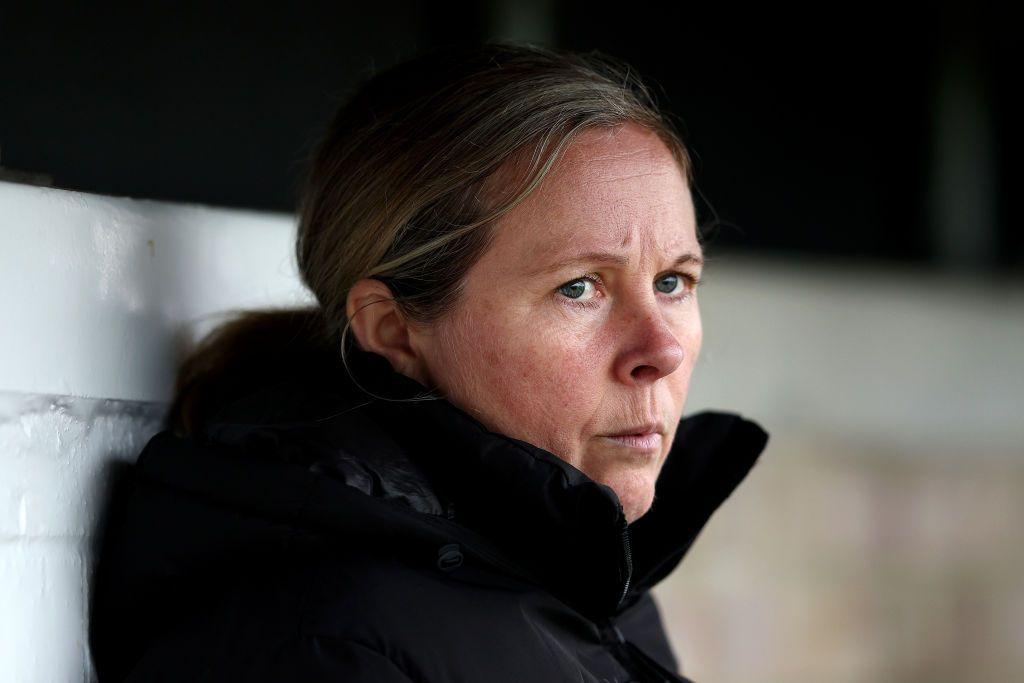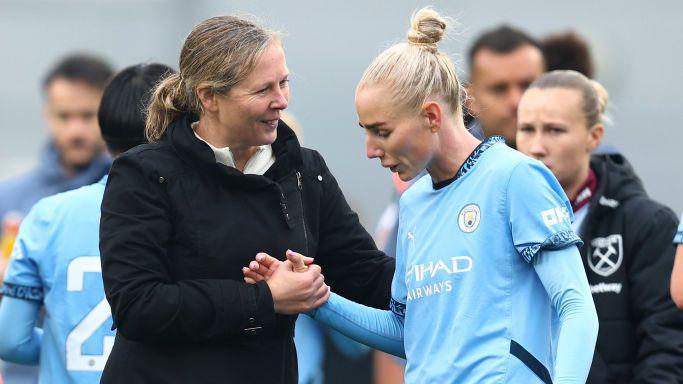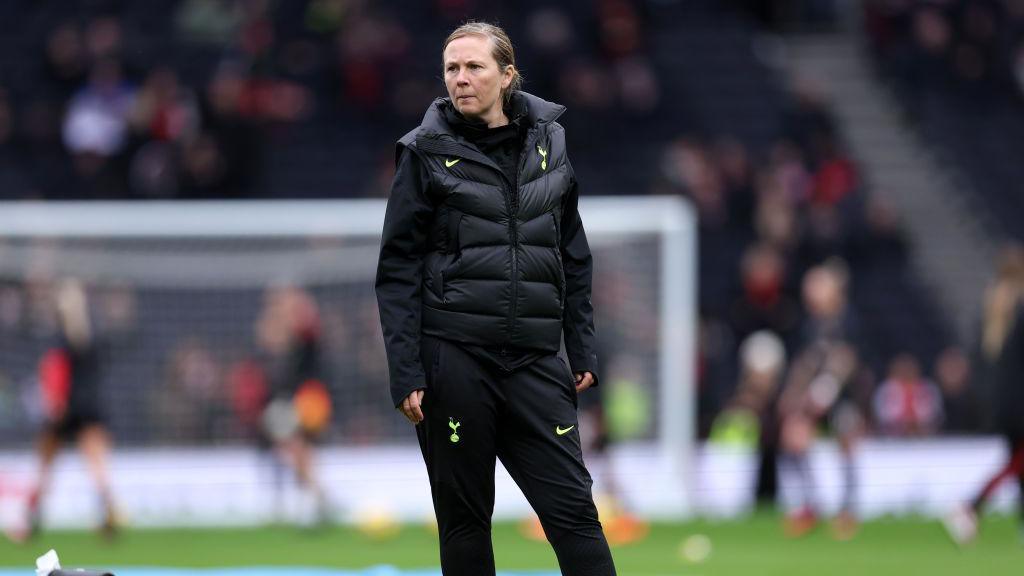Skinner says mental health of managers 'a huge concern'

Rehanne Skinner is a former England and Wales assistant coach
- Published
West Ham boss Rehanne Skinner knows what it's like to be in a lonely place in her job - and believes it is a common feeling among Women's Super League managers.
Under constant scrutiny, facing the risk of being sacked at any point during a winless run, and often juggling expectations with little resources.
It's a thankless task because managers are taking on so many extra responsibilities within a club that only add to the pressures.
The 45-year-old has been in the game since 2002 and worked at Leicester City, Arsenal, Tottenham and West Ham, as well as Wales and England.
In an exclusive interview with BBC Sport and the Girls on the Ball podcast, Skinner discussed why mental health wellbeing was a topic close to her heart.
Is there enough mental health support in the WSL?
- Published17 January 2024
'It makes you question your methods'
One of the ways Skinner has managed her mental health is through the comfort of her three dogs. She values their affection and the necessity to get outdoors for walks, away from the daily pressures of football.
Cocker spaniel Alfie is the oldest and wisest of the three dogs, aged 14, and is a comfort for two-year-old sproodle Poppy, who spends most of the walk chasing after deer. Luna, a chocolate sproodle aged eight, is sensitive, "keeps Poppy in line" and is very playful.
Skinner, who was accompanied by her dogs at Weald Country Park in Brentwood during the interview, was appointed by West Ham in 2023 following a three-year spell at Tottenham.
"There has definitely been highs and lows in my career. There has been so much growth in the game but the demands on managers are at the highest they have ever been, and the resource, support and expectation often doesn't match," said Skinner.
"When that culminates in being sacked it definitely makes you question everything. It's human nature to question your methods and it can knock your confidence. You also worry about the financial implications on your family.
"The role can move you all over the world, so partners are often changing jobs to support you. It's a massive commitment that people don't talk about.
"Those spells when it happens are really tough to think about going back into a job. It's natural to lose trust."

Skinner is one of the most experienced managers in the WSL
Between 2020 and 2023, Skinner lived away from her partner to manage Spurs. She felt "burned out" by the time of her dismissal.
While Premier League managers often have multiple members of support staff, a lucrative financial package when they join, and longer, secure contracts with better pay-out clauses, that is not often the case in the WSL.
Managers could be expected to move homes, quit full-time jobs and temporarily leave their partners, despite only being offered an 18-month contract.
They often take on a host of responsibilities, with few senior staff at women's clubs, placing more stress on them to recruit players in the transfer window, for example.
Their average salaries, while undisclosed, are believed to be around £70,000 - although that figure is skewed by a few abnormally high wages at wealthier clubs.
At international level, Lionesses boss Sarina Wiegman is reportedly on an annual salary of £400,000, plus performance-related bonuses, while men's manager Thomas Tuchel earns £5m per year.
The reality, therefore, is that they cannot afford to be out of work for long.
Ex-Manchester United manager Casey Stoney was sacked as head coach of American club San Diego Wave while she had temporarily returned to England for a funeral. She, and her family, were unable to return to their California home as their visas had been terminated.
"There's pressure on every game, and scrutiny of what you're doing with little understanding of what goes on behind the scenes - the lack of infrastructure, number of staff and player availability," added Skinner.
"A lot of clubs don't have strong senior staff because of the lack of resourcing so that requires more from the manager. What you are paid doesn't match up to the expectations.
"It was hard for me when I left Tottenham because of the amount I personally invested in it. When you look back, you think to yourself, 'I'm not sure why I did that?'
"You're on your own a lot and it's a lonely place to be."
'It's being paid lip service'

Skinner managed Tottenham between 2020 and 2023 before taking over at West Ham
Skinner has found mental health support often "reactionary".
A problem, she believes, is there are few people for managers to turn to. If they raise issues within clubs, it is often to a senior figure who decides their future in the job, so there is a fear it will be seen as a "weakness" and used against them.
"There is a risk to being honest. Your job is to be expected to turn up and do everything regardless of what is going on in your life," said Skinner.
"Mental health and wellbeing is part of performance. Coaches are high-performing every week, just like players. Yet it's not something that's talked about.
"It's a huge concern. Most of the time managers will talk to other managers because outwardly, where you go for that support, is really difficult.
"There's only one place and that's the LMA (League Managers' Association). They are the only independent entity that recognises stresses that managers are under."
Managers pay a small membership fee to the LMA, but Skinner says the organisation needs more funding.
The Football Association backs player care roles at clubs, while Sporting Chance is a charity that has a 24/7 helpline.
WSL Football offer in-person check-ins with coaches and are represented within the Pro Coach Partnership (PCP) who discuss and review provisions across the men's and the women's game.
However, focus for mental wellbeing in the WSL is thought to be largely player-centred.
A government review in 2023, that was led by former England midfielder Karen Carney, highlighted several areas that needed improvement for performance but did not refer to mental wellbeing of coaches.
"I just don't think it's engrained in the thought-processes of what people are doing. It feels like it's being paid lip service because it's an afterthought," added Skinner.
"The game has grown so fast but it hasn't kept up in so many ways. It's already tough for people [to talk] when they're not in a great place.
"If you're somewhere where it is the norm and there's consistency of support, and it's talked about in the context of improving performance, then it becomes easier.
"We're just reacting when people are already not in a great place rather than supporting regularly."
'Health and wellbeing aids performance'
Skinner has worked with the LMA on recent studies they hope will shine a light on some of the issues for WSL managers and how they can be helped.
Among the requests from her is to have an external mentor who works with a cluster of managers on a regular basis, education them on mental health support tools.
"It would become a trained activity to support mental health and your performance, rather than ad-hoc courses for education," said Skinner.
"I appreciate those courses but they are short-lived. That's what needs to change. The only way to do it is by investing money into it.
"The big organisations involved have to get on board with it - the FA, the league and clubs. Everybody has a vested interest in the growth of the game of which managers are a key part.
"Every single club needs to have people behind a manager who are senior figures that can do senior roles so not one person is doing too many jobs."
Skinner also hoped mental wellbeing training and education could be seen as a tool to aid performance and not a taboo subject.
For her, it should be a conversation that should never stop - and must be made a priority.

Ben Haines, Ellen White and Jen Beattie are back for another season of the Women's Football Weekly podcast. New episodes drop every Tuesday on BBC Sounds, plus find interviews and extra content from the Women's Super League and beyond on the Women's Football Weekly feed